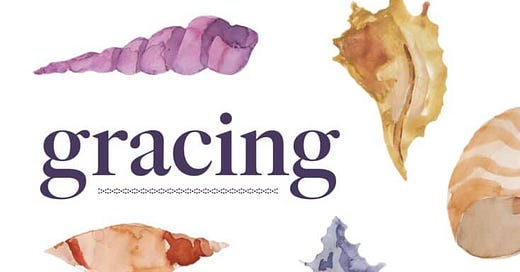What if God lived with you? Right now. Every day. On this side of eternity. What if grace was not a thing that eventually made you fit for heaven, but a way to experience heaven now? What if you lived grace as a verb instead of a noun?
Hannah Packard Crowther explores this abundant, nourishing, and down-to-earth spiritual life. Coined gracing, this way of being blurs the boundaries between holiness and the mundane, between a future paradise and a present one. She pivots from lyrical reflections on fireflies to humorous pop-culture anecdotes, from wrestling with chronic disease to delighting in the sonic underwater calls of pantropical spotted dolphins. She explores algebraic relationships and family relationships, Jewish covenant and ecological interconnectedness, her Latter-day Saint faith alongside her universal hope.
Framed as a collection of seashells, Gracing gathers truths and moments that point to a deep, universal ocean—an everyday, intimate partnership with God. Ultimately, readers are invited into this creative and vibrant life.
READ AN EXCERPT:
WHAT PEOPLE ARE SAYING:
You are fortunate to have Hannah Packard Crowther's book in your hands. In it you will find uncommon and wide-ranging insight on a host of issues—from science to family life to personal health—all in the interest of helping you to live a more grace-filled life of connection to what is good and holy and present before you. This is a lesson manual in how to live the abundant life that Jesus promised is available to the faithful, here and now.
—George Handley, author of If Truth Were a Child
In this beautiful book Hannah Packer Crowther defines 'gracing" as a divine invitation to us all to assist God in the healing of the human family of which each of us who live on this planet is a member. As do our Heavenly parents, we are to lift hands that hang down and strengthen knees that are weak with love that is without judgement or prejudice. For, we remember that we are all wounded and suffering.
—Fiona Givens, co-author of All Things New
The word "gerund" is, alas, an unlovely term for a grammatical superpower: to convert a word into a gerund with the addition of "-ing" is to transform it into a noun, an adjective, and an active, ongoing verb. Hannah Packard Crowther gives "grace" the gerund treatment in her new book "Gracing," which invites readers to discover how divine grace manifests not just as a future heavenly gift, but as an active, present force weaving through our everyday lives. Crowther's insights are as bracing as they are gracing (adj). They teach us how to grace (verb) our way through life's darkness and joy. To know heaven as a present reality, not a distant shore, is, indeed, a gracing (noun).
In fourteen interconnected essays, Crowther draws from her experiences as a mother, teacher, and person living with chronic illness to illuminate how grace appears in unexpected places: in difficult conversations with teenagers, in the companionship of a rescue dog, in the patient practice of mastering violin pieces, and even in the challenging moments of autoimmune fatigue. She blends insights from biology, theology, literature, and personal narrative to explore how we might live more grace-filled lives.
Crowther's alert, faithful mind traces connections between scientific understanding, social experience, and spiritual wisdom. Through her eyes, evolution is God's creative play, cellular biology reveals patterns of divine relationship, and the natural world demonstrates grace in action. Her reflections are deeply rooted in Latter-day Saint faith even as they seek connection with other religious and secular traditions. The book includes thoughtful reflection questions that invite readers to explore their own experiences of grace and consider how they might more fully embrace its presence in their lives.
—Rosalynde Welch, Associate Director, Maxwell Institute
Grace as a present tense verb, as a vicarious manner, as an open invitation, as a fruitful collaboration, as a perpetual consecration—what can I say but "Amen!" and "Amen!""
—Adam S. Miller, author of Original Grace and The Christ Child





